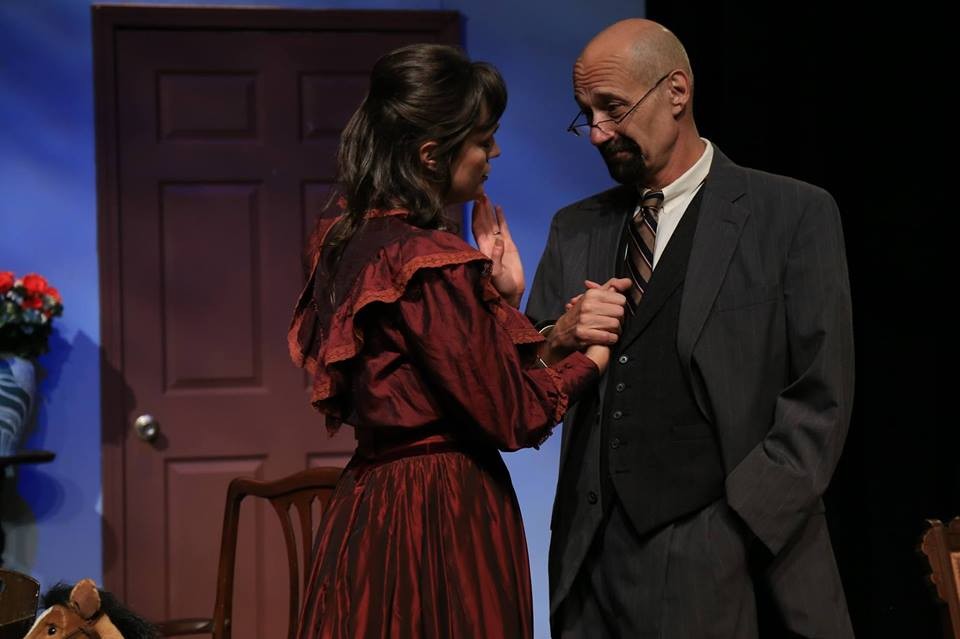 JLappin Photography
JLappin Photography
Shannon Walton and Mark Pergolizzi in A Doll’s House, Evergreen Theatre.
I’m glad CentreStage is dusting off Ibsen’s A Doll’s House, for a number of reasons. Mainly because I’m a nerd and I think, having ascribed to the usual conversations about this groundbreaking piece of modern drama, I may have missed some things, subtle and unnerving as a Roxy Music joint. Since this is a 150-year-old classic I’ll skip plot details, and get right to the meat of an academic concern that may not interest another living soul, but hey — that’s what blogs are for! If you need a refresher course, there’s plenty to choose from.
It’s probably not so strange, given translation goals, that the publishers continue to use the well-branded title A Doll’s House even though that’s not quite right. In Norway “Doll House” is a distinct word, and one that playwright Henrik Ibsen specifically rejected in favor of something closer to “A Home for Dolls,” which is less catchy, but bends things in this atypical Christmas story in a slightly different direction. The never-used title implies a system of domesticity that imprisons all of us, not just women.
Shakespeare, Ibsen, Angry Jurors, and Muhammad Ali: Memphis Theaters offer variety.
Don’t worry, I’m not going #AllLivesMatter here. It’s a play about women in a place where there’s little opportunity for fulfillment, and I’m not here to bury the playwright’s message. Rather to praise his selection of flawed heroes whose choices are steered by rules spoken and un, and not easily understood in terms of good, bad, right or wrong. With A Doll’s House we can almost see an inverse to Martin Luther King’s idea that none of us are free until all of us are. In the basic “must-be-more-money” rooms inhabited by Nora and Torvald, nobody can be free until somebody is. Her escape will obviously demand a price.
A Doll’s House‘s exploration of marriage and sexual inequality broke so much fresh Earth in 1879, but I’ve been giving second thoughts to August Strindberg’s real-time criticism of the play’s iconic end — The sound of a door slamming and a woman, liberated from traditional constraint, striking out without husband or children. Conventional wisdom holds, with that slam, the famously progressive Ibsen reimagined women as, “human beings first, wives and mothers second.” This was “swinish,” to Strindberg, who was Ibsen’s more fanciful, but socially conservative peer. Ibsen’s female protagonist, Strindberg argued, wouldn’t leave her children behind, which sounds like typical conservative douchebag thing to say. But his concern wasn’t really that a mother left her children behind so much as he didn’t believe she would leave them in an environment she found toxic, in the care of a man she can’t abide.
Strindberg’s complaints are rooted in his own issues but highlight the fact that Nora’s abandonment of family may be less the choice of a liberated woman than the projection of a male playwright making a man’s choice in a woman’s story.
As is the case with other Ibsen plays like Pillars of Society and Enemy of the People, the big antagonists can be systems inclusive of extortionists, leeches etc. more than the extortionists, leeches, etc. themselves. Conflict’s made inevitable by controlled economies and all manner of cultural corseting — Houses wherein Ibsen’s dolls are expected to play out proscribed sexual and social fantasies. Simply said, a lot happens in Ibsen’s home for mannequins, automatons, and dolls called into the world, etc. How much did I miss as the reluctant schoolboy, when classics tasted like medicine?
 Queen Carla
Queen Carla
Queen Ann (Marie Hall) as Lizzy-1 in Shakespeare in Love.
Blah, blah, blah. Important information: A Dolls House opens at the Evergreen Theatre Friday, Sept. 22.
In the mood for something more Elizabethan, but not as challenging as Shakespeare, and maybe a little familiar? Shakespeare in Love opens at Playhouse on the Square this week. Not the movie, of course, the stage version. I know, following productions of Priscilla Queen of the Desert, and 9 to 5, it’s starting to feel like a real Inception/Cloud Atlasy warping of spacetime is going on over on Cooper Street, right? And the cinematic blackouts between scenes in The Flick (recently closed at Circuit Playhouse) are being rolled out ad seriatim across the street at Playhouse on the Square where they’ve got more movie titles than Indie Memphis. (Totally free to steal that slogan). It’s freaking me out, man!
Here’s a video preview.
Shakespeare, Ibsen, Angry Jurors, and Muhammad Ali: Memphis Theaters offer variety. (2)
Other onstage offerings this week include Fetch Clay, Make Man, which I preview here, Twelve Angry Jurors which I review here, and Years to the Day, which may be the play to see if you’re seeing only one.